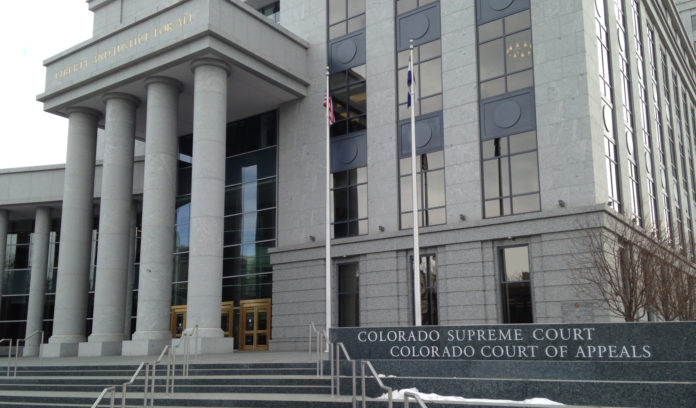
The Colorado Supreme Court granted a petition for a writ of certiorari in a murder case dating back to 2017.
According to a 2022 Colorado Court of Appeals opinion, Joseph Washington and his girlfriend went to a barbecue at Cherry Creek State Park hosted by Jason Pope. Jackson Chavez and his ex-girlfriend were at the park in a different group and an argument between them became physical, according to court records. Pope and Washington learned of Chavez’s behavior and they asked him to leave, leading to an altercation.
Washington shot Chavez twice in the chest, killing him. The gun was located in a brown backpack Washington and his girlfriend brought with them to the barbecue, according to court records. Washington then left the park with his girlfriend. Washington and his girlfriend returned to his house where they packed two backpacks, including the brown one from the barbecue.
Later, Washington’s friend picked him and Washington’s girlfriend up from a hotel and they went to a restaurant. Eventually, they drove to a gas station and Washington was arrested. Police got a search warrant for the vehicle Washington was sitting in when he was arrested. The police found the brown backpack, along with another one in the vehicle and drugs were found. Authorities also obtained a search warrant for Washington’s house where they discovered drugs.
Prosecutors charged Washington with first-degree murder. The court issued a mandatory protection order that prohibited him from contacting or directly or indirectly communicating with his girlfriend. Prosecutors later amended the complaint to include 11 counts of possession with the intent to sell or distribute a controlled substance.
In jail, Washington wrote a letter to his girlfriend and called her, discussing her communications with police, his charges and possible defenses. As a result of this, Washington was also charged with a violation of a protection order and tampering with a witness or victim.
A person housed at the jail with Washington told prosecutors Washington told two men there he needed to get rid of his girlfriend. Prosecutors amended the complaint again to include two counts of solicitation to commit first-degree murder.
Before the trial, Washington moved to sever, arguing both improper joinder under Criminal Procedure 8 and he was entitled to relief from prejudicial joinder under Crim. P. 14. The trial court ruled the joinder under Crim. P. 8(a)(2) was permissible because the charges were all interrelated and interconnected. The trial court denied Washington’s discretionary request for severance under Crim. P. 14.
At trial, Washington didn’t testify, but his counsel argued Washington shot Chavez in self-defense and claimed the drugs didn’t belong to him. His counsel admitted Washington violated a protection order.
The jury convicted Washington of second-degree murder, 10 counts of possession with intent to sell or distribute a controlled substance, violating a protection order and tampering with a witness or victim.
On appeal, he contended the trial court erred by trying the murder and drug charges together. In the 1972 Colorado Supreme Court decision Norman v. People, the high court held that joinder was improper under Crim. P. 8 and that the refusal of the court to grant defendants’ request for a severance for trial required a reversal and a new trial.
Under the 2014 Colorado Supreme Court case People v. Novotny, the state high court held only error rising to the level of structural error required reversal. In Novotny, the high court also overruled its prior holdings to the contrary, finding the reversal of a criminal conviction for something other than structural error, in the absence of a legislative mandate or a case specific, outcome-determinative analysis, cannot be sustained.
Based on that language, the Colorado Court of Appeals in Washington’s case concluded Novotny overruled Norman to the extent Norman held a joinder error required automatic reversal. After applying the definitions of structural and trial error, the appeals court held misjoinder under Crim. P. 8 is a trial error subject to harmless review.
The appeals court found any error in joining Washington’s charges under Crim. P. 8(a)(2) was harmless for multiple reasons including that the trial court instructed the jury to consider the evidence and law applicable to each count separately.
The appeals court unanimously affirmed the judgment.
The Colorado Supreme Court is asked to determine whether the appeals court erred holding Novotny overruled Norman; if the appeals court erred using a harmless error standard of reversal for the misjoinder of charges for trial; and whether the trial court erred consolidating Washington’s murder and drug charges.
The Colorado Supreme Court April 10 also granted a petition for writ of certiorari in a case connected to the Health Care Availability Act.

